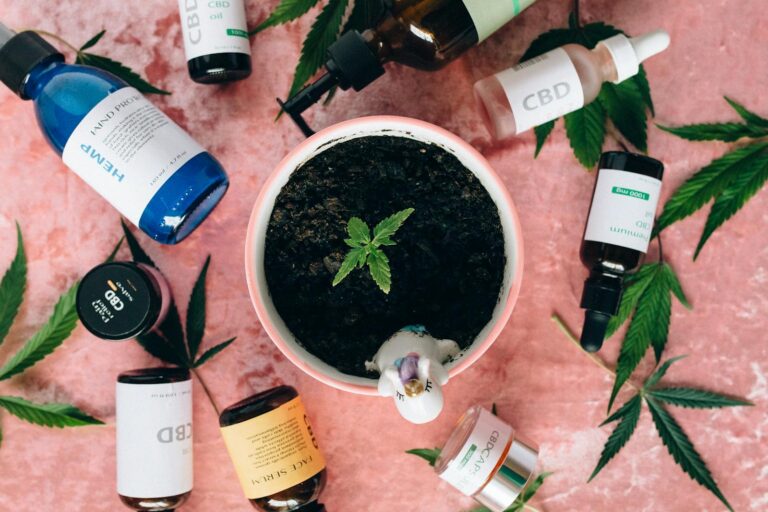Exploring If CBD is Good for Skin Health – Key Insights

In recent years, CBD has surged in popularity not only for its potential internal health benefits but also for its applications in skincare. The central question—Is CBD good for skin health?—has sparked curiosity among consumers and researchers alike. This article delves into the science, benefits, and practical considerations of using CBD for skin care, providing a comprehensive guide to help you make informed decisions about incorporating it into your routine.
CBD and Skin Health: An Overview of Potential Benefits
CBD, or cannabidiol, is a natural compound extracted from the cannabis plant, known for its non-psychoactive properties unlike THC. It has gained attention in the skincare industry for its potential to address various skin concerns through anti-inflammatory, antioxidant, and soothing effects. This section explores the foundational aspects of how CBD might contribute to overall skin health, drawing from emerging research and anecdotal evidence. While CBD isn’t a cure-all, its interaction with the body’s endocannabinoid system could offer promising support for maintaining healthy skin.
The Basics of CBD and Its Skin-Relevant Properties
CBD works by interacting with the endocannabinoid system (ECS), which plays a crucial role in regulating skin functions like inflammation and oil production. This system consists of receptors spread throughout the skin, helping to maintain balance or homeostasis. When applied topically, CBD can penetrate the skin layers, potentially reducing redness and irritation. Studies suggest that CBD’s anti-inflammatory effects may stem from its ability to inhibit certain enzymes that cause swelling, making it a candidate for conditions like acne or psoriasis.
Beyond inflammation, CBD exhibits antioxidant properties that combat free radicals, which are unstable molecules that damage skin cells and accelerate aging. This means CBD could help protect the skin from environmental stressors such as pollution and UV radiation. In practical terms, users often report smoother, more hydrated skin after incorporating CBD products, attributed to its potential to enhance the skin’s barrier function. Overall, these properties position CBD as a multifaceted ingredient in skincare, offering benefits that extend beyond surface-level hydration.
Potential Benefits for Specific Skin Types
For those with oily or acne-prone skin, CBD’s ability to regulate sebum production is particularly noteworthy. Excessive oil can clog pores and lead to breakouts, but CBD may help balance this by modulating the activity of sebaceous glands. Research indicates that CBD can reduce the proliferation of acne-causing bacteria and alleviate associated inflammation, potentially leading to clearer skin over time. This makes it appealing for individuals struggling with persistent blemishes, providing a natural alternative to harsher chemical treatments.
Dry or sensitive skin types might benefit from CBD’s moisturizing effects, as it can help reinforce the skin’s natural barrier. By promoting ceramide production, which are fatty molecules that lock in moisture, CBD-infused products could improve elasticity and reduce flakiness. Additionally, for aging skin, the antioxidant capabilities of CBD may diminish the appearance of fine lines and wrinkles by neutralizing oxidative stress. User testimonials often highlight how CBD creams have soothed eczema or dermatitis, underscoring its versatility across different skin profiles and emphasizing why exploring CBD could be worthwhile for personalized skincare routines.
Integrating CBD into a Daily Skincare Regimen
Incorporating CBD into your skincare routine doesn’t have to be complicated, but starting with high-quality products is essential for reaping benefits. Many people begin by applying CBD oils or serums in the evening, allowing the compound to work overnight without interference from daytime pollutants. Consistency is key, as effects may not be immediate; it could take several weeks to notice improvements in skin texture or reduced inflammation. Experts recommend patch-testing first to avoid any adverse reactions, ensuring that CBD complements rather than complicates existing routines.
Beyond topical use, some individuals explore oral CBD supplements for holistic skin health, as systemic absorption might enhance overall wellness and indirectly benefit the skin. However, it’s important to consult with a dermatologist before making changes, especially if you have underlying conditions. Real-world success stories, such as those shared on wellness forums, often describe CBD as a game-changer for chronic skin issues, but results vary. By understanding these integration strategies, readers can approach CBD with realistic expectations and a tailored approach to skin health.
Exploring the Science: How CBD Interacts with Skin Receptors
The scientific community has been actively researching CBD’s effects on the skin, uncovering how this compound interacts with specific receptors to influence health outcomes. This section dives into the mechanisms behind CBD’s potential benefits, supported by studies and expert insights. By examining the molecular level, we can better understand if CBD is indeed good for skin health, moving beyond hype to evidence-based conclusions. This exploration not only highlights CBD’s promise but also addresses gaps in current research.
The Endocannabinoid System and Skin Function
The endocannabinoid system (ECS) is a complex network of receptors, enzymes, and endocannabinoids that regulate various physiological processes, including skin homeostasis. CB1 and CB2 receptors, found in high concentrations in the skin, respond to cannabinoids like CBD, potentially modulating pain, inflammation, and immune responses. When CBD binds to these receptors, it may reduce the release of pro-inflammatory cytokines, helping to calm irritated skin. This interaction is particularly relevant for conditions involving chronic inflammation, wherethe ECS plays a vital role in maintaining balance.
Research has indicated that the ECS is involved in regulating oil production, skin cell proliferation, and even hair follicle development. This means that by influencing these processes, CBD could help manage conditions like acne, psoriasis, and hair loss. For instance, studies have shown that CBD can inhibit sebocyte proliferation (the cells that produce sebum) and reduce inflammatory responses, making it a promising option for treating oily and acne-prone skin. Furthermore, understanding how to harness the ECS through CBD opens up new avenues for skincare innovation, paving the way for more targeted treatments.
Mechanisms of Action: How CBD Alters Skin Conditions
CBD’s mechanisms of action are multifaceted, particularly when it comes to its effects on skin conditions. Its anti-inflammatory properties can significantly alleviate symptoms associated with eczema, dermatitis, and psoriasis. By binding to CB2 receptors, CBD may suppress the immune response that typically exacerbates these conditions, allowing for a reduction in redness and scaling.
Additionally, some studies suggest that CBD’s antioxidant properties can minimize oxidative stress in skin tissues, which is crucial for combating aging signs. The compound not only neutralizes free radicals but also enhances the skin’s resilience to environmental aggressors. This dual action reinforces the argument for incorporating CBD into skincare regimens aimed at addressing both signs of aging and sensitivity.
Moreover, CBD’s capacity to modulate pain perception can be beneficial for those suffering from skin conditions that also involve discomfort. By interacting with the ECS, CBD may reduce itchiness or burning sensations associated with inflamed skin, providing relief that goes beyond cosmetic benefits.
Biological Considerations: Safety and Efficacy
As with any ingredient in cosmetics, safety and efficacy must be considered when integrating CBD into skin care. Current research indicates that CBD is generally well-tolerated across various skin types, although individual reactions may vary. A thorough examination of available studies reveals that while many participants report positive outcomes, others have experienced mild side effects such as irritation or allergic reactions.
Furthermore, understanding dosage is critical. While higher concentrations may offer intensified benefits, they could also increase the risk of adverse reactions. It’s advisable to start with lower concentrations and gradually increase as needed, monitoring the skin’s response over time. As more clinical trials are conducted, definitive conclusions about optimal dosages and formulations will emerge, helping consumers make informed choices.
CBD for Common Skin Conditions: Acne, Eczema, and More
Skin conditions like acne and eczema affect millions worldwide, prompting individuals to seek effective treatment options. CBD presents an intriguing alternative to traditional remedies, potentially offering relief without harsh side effects. This section focuses on specific skin conditions and evaluates how CBD may play a role in their management.
Acne: A New Approach to Breakouts
Acne is a prevalent condition characterized by excessive oil production and inflammation. Traditional treatments often include topical retinoids and antibiotics, which can lead to various side effects, including dryness and irritation. CBD’s natural anti-inflammatory and antibacterial properties make it an attractive alternative for managing acne.
Research suggests that CBD can inhibit the sebaceous glands’ activity, reducing excess oil that leads to clogged pores. Additionally, its ability to diminish inflammation and bacterial growth contributes to clearer skin over time. Many users have reported significant improvements in their acne after using CBD-infused products, marking a shift towards more holistic approaches in skincare.
Moreover, CBD’s soothing properties may help alleviate the psychological distress often associated with acne. By promoting a calmer complexion, users may experience increased self-esteem and reduced anxiety related to their skin appearance. This psychological benefit underscores the comprehensive impact CBD can have on skin health.
Eczema and Dermatitis: Soothing Irritation
Eczema and dermatitis are chronic conditions characterized by dry, itchy, and inflamed skin. Treatment typically relies on moisturizing agents and corticosteroids, which may carry long-term risks. Here, CBD could represent a gentler, yet effective, approach to managing symptoms.
Studies indicate that CBD can help restore moisture balance by reinforcing the skin barrier, thus alleviating dryness and preventing flare-ups. Its anti-inflammatory properties may also work to calm irritated skin, significantly improving comfort levels for those affected. Personal anecdotes frequently highlight how CBD creams have provided rapid relief during eczema outbreaks, showcasing its potential as a valuable component of eczema management strategies.
Importantly, CBD’s safety profile makes it suitable for all ages, including children who suffer from eczema. Parents often report successful use of CBD products to soothe their children’s irritated skin, emphasizing its gentle nature compared to harsher chemical alternatives.
Psoriasis: Inflammation and Scaling Reduction
Psoriasis is another challenging skin condition marked by accelerated skin cell turnover and chronic inflammation. Patients often experience painful plaques that can be difficult to treat with conventional therapies. CBD offers a novel approach by targeting the underlying causes of psoriasis rather than just the symptoms.
By inhibiting the cytokines responsible for inflammation, CBD may help to reduce the severity and frequency of psoriatic flare-ups. Preliminary studies indicate promising results, with patients reporting decreased scaling and redness. Moreover, the moisturizing effects of CBD can prevent the dryness that often accompanies psoriasis, further enhancing overall skin health.
Patients seeking alternative or complementary therapies for psoriasis increasingly turn to CBD, empowered by testimonials and early research. Continuing studies will shed light on the effectiveness of CBD in larger populations, guiding future treatment protocols.
Types of CBD Skin Care Products: Serums, Creams, and Oils
The market offers a diverse array of CBD-infused skincare products, each designed to cater to different needs and preferences. Understanding the types of products available can help consumers select the right formulation for their skin type and concerns. This section categorizes common CBD skincare items while exploring their unique attributes.
CBD Serums: Concentrated Benefits
Serums are lightweight formulations that deliver concentrated active ingredients directly into the skin. CBD serums, rich in cannabidiol, penetrate deeply and provide targeted benefits, making them ideal for addressing specific concerns like fine lines or uneven skin tone.
Many users gravitate towards serums because they often combine CBD with other beneficial compounds such as hyaluronic acid or vitamin C, enhancing their hydrating and rejuvenating properties. When applied regularly, CBD serums can improve overall skin texture, leaving it plump and youthful-looking.
However, it’s essential to choose a serum formulated for your specific skin type. Oily skin may benefit from gel-based serums, which absorb quickly, while dry skin might favor oil-based serums that provide additional moisture. The versatility of CBD serums allows users to tailor their skincare routine effectively.
CBD Creams: Moisturizing and Protective
Creams are perhaps the most popular form of CBD skincare, particularly suited for individuals with dry or sensitive skin. Generally thicker than serums, CBD creams create a protective barrier on the skin, locking in moisture while delivering the anti-inflammatory benefits of cannabidiol.
These products are ideal for daily use, as they can be easily incorporated into morning and evening routines. Rich in fatty acids, CBD creams not only hydrate but also nourish the skin, supporting its natural barrier function. Users often report a noticeable reduction in irritation and flakiness after consistent application, highlighting the benefits of these nourishing formulations.
Moreover, the soothing properties of CBD creams make them appropriate for addressing various skin conditions, from eczema to rosacea. Their applicability across diverse issues showcases the adaptability of CBD in skincare.
CBD Oils: Versatility in Application
CBD oils offer incredible versatility, serving as both a topical treatment and a supplement for overall wellness. When applied to the skin, these oils can deliver a dose of cannabinoids while also providing hydration and nourishment. Many people enjoy incorporating CBD oils into their existing skincare routines by mixing them into lotions or creams for enhanced benefits.
Additionally, CBD oils can be ingested for systemic effects, promoting overall health which may indirectly benefit the skin. Combining topical and internal applications creates an integrated approach to skincare, appealing to those looking for comprehensive solutions.
When selecting CBD oils, consumers should consider potency, sourcing, and extraction methods to ensure high-quality products. Ultimately, the choice between oils, creams, or serums depends on individual preferences and skin needs, making it essential to explore and experiment with various options.
Choosing the Right CBD Product for Your Skin: Dosage and Quality
Navigating the world of CBD skincare can feel overwhelming due to the myriad options available. Ensuring you choose the right product requires an understanding of dosage, quality, and personal skin needs. This section provides guidance to help streamline the selection process.
Understanding Dosage: Finding What Works for You
Determining the correct dosage of CBD in skincare can greatly impact its effectiveness. Unlike oral supplements where dosage is more standardized, topical applications require consideration of concentration and frequency of use.
Most CBD skincare products range from 100 mg to 2000 mg of CBD per container. Beginners may want to start with lower concentrations, assessing how their skin reacts before moving to more potent formulations. A gradual approach enables users to tailor their skincare routine according to their individual needs, ensuring optimal results.
It’s recommended to apply CBD topically once or twice daily, depending on the product and skin condition being treated. Observing changes in skin texture, hydration, and overall appearance will inform whether adjustments in usage are necessary.
Evaluating Product Quality: Important Factors
Quality should be at the forefront when selecting CBD skincare products. Not all CBD is created equal; therefore, consumers should prioritize products made from organically grown hemp, free from pesticides and heavy metals. Third-party lab testing ensures that the product contains the advertised amount of CBD and is devoid of harmful contaminants.
Reading product reviews can provide insight into real-world effectiveness and user experiences. Look for brands that promote transparency regarding their sourcing and manufacturing processes and offer educational resources about their products.
Additionally, consider the formulation. Products containing nourishing ingredients alongside CBD—such as antioxidants, vitamins, and botanical extracts—can elevate the overall benefits, providing a synergistic effect for enhanced skin health.
Personal Skin Needs: Tailoring Your Selection
Every individual’s skin is unique, requiring personalized attention when choosing CBD skincare products. Identifying your primary skin concerns is crucial—are you dealing with dryness, acne, or signs of aging? Understanding your skin type—oily, dry, combination, or sensitive—will guide you towards the most suitable formulations.
For example, if you have oily skin prone to breakouts, lightweight serums or gels infused with CBD may be ideal. Conversely, those with dry or sensitive skin might prefer richer creams or oils for optimal hydration and protection. Adjustments can also be made based on seasonal changes; heavier products may be favored in winter, while lighter ones could suffice in summer.
Ultimately, taking the time to assess your skin’s specific requirements will lead to a more satisfying and effective skincare regimen.
Potential Risks and Side Effects of CBD on Skin
While CBD is generally regarded as safe, it is essential to acknowledge the potential risks and side effects associated with its use. Understanding these aspects will enable users to make informed decisions about incorporating CBD into their skincare routines.
Possible Side Effects: What to Watch For
Although most users tolerate CBD well, there are potential side effects to consider. Some individuals may experience skin irritation, allergic reactions, or redness, particularly if they use products containing additional active ingredients. Performing a patch test before widespread application can help identify adverse reactions early on.
In rare cases, individuals may find CBD products exacerbate existing skin conditions instead of alleviating them. Monitoring your skin’s response following the initial application phase is vital, and discontinuation may be warranted if negative effects occur.
Additionally, while CBD itself does not cause psychoactive effects, poorly sourced products may contain residual THC or contaminants that could lead to unintended side effects. Choosing reputable brands that emphasize transparency can mitigate these risks.
Drug Interactions: Consultation is Key
Another aspect to consider is the potential for CBD to interact with other medications. Since CBD can influence liver enzymes responsible for metabolizing numerous drugs, individuals on prescriptions should consult healthcare professionals before introducing CBD into their routines.
Understanding drug interactions is crucial for ensuring both safety and efficacy, especially for those managing chronic conditions. Doing so will lead to a more harmonious approach to wellness that encompasses both skin health and overall well-being.
Regulatory Landscape: Navigating Uncertainties
The regulatory landscape surrounding CBD products is still evolving, leading to uncertainties regarding labeling, quality control, and marketing practices. Consumers may encounter products that claim exaggerated benefits or misrepresent cannabinoid content due to insufficient oversight.
To navigate this environment, educating oneself about reputable certifications, reading independent reviews, and staying informed on upcoming regulations is crucial. Engaging with knowledgeable skincare professionals and utilizing platforms that track industry developments can further protect consumers from subpar products.
Conclusion
CBD has emerged as a prominent player in the skincare industry, offering a variety of potential benefits for skin health. Through its interaction with the endocannabinoid system, CBD demonstrates promise in addressing various skin conditions, from acne and eczema to aging signs. As the market diversifies with numerous product types—serums, creams, and oils—individuals can tailor their skincare routines to meet personal needs.
However, knowledge about dosage, quality assessment, and potential risks remains paramount for consumers venturing into CBD skincare. By prioritizing evidence-based choices and remaining attuned to their skin’s responses, individuals can harness the potential of CBD to enhance their skincare regimens.
As research continues to unfold, our understanding of CBD’s role in skin health will deepen, paving the way for innovative solutions and personalized treatments. Embracing the journey of exploring CBD in skincare can lead to transformative experiences, ultimately contributing to healthier, more radiant skin.






